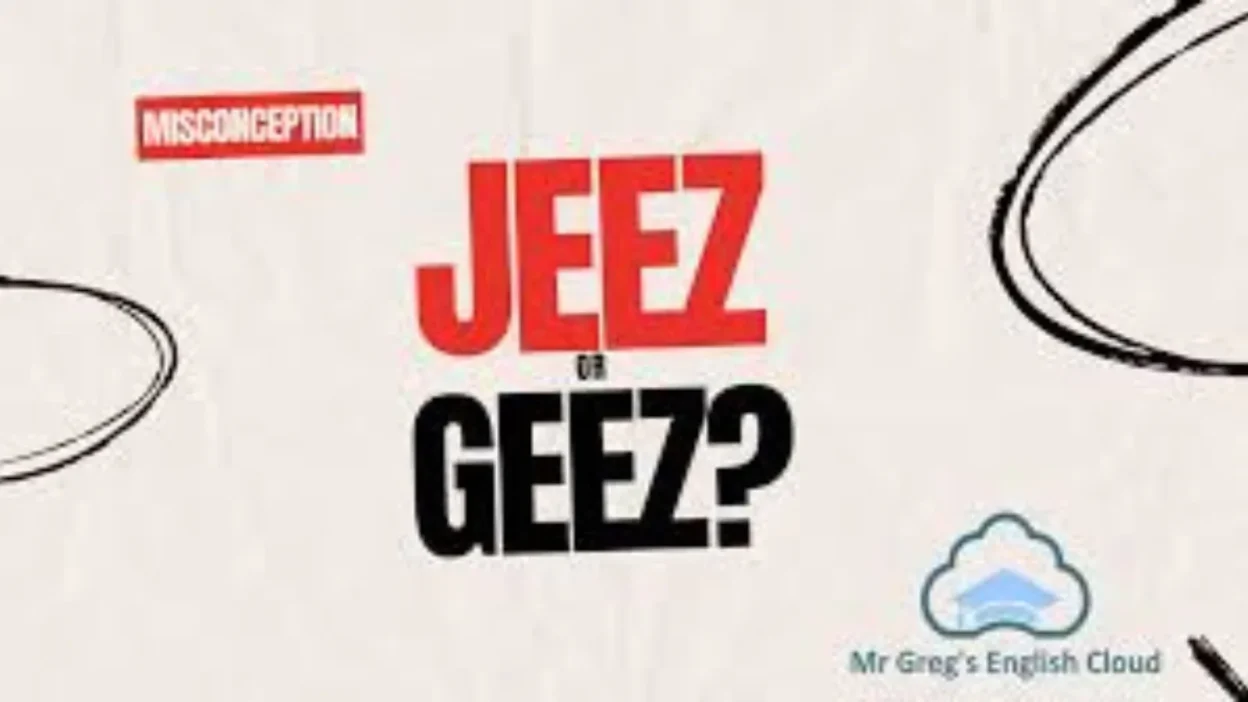Ever paused mid-text, wondering whether to write “geez” or “jeez”? You’re not alone.
This simple expression of surprise or mild frustration has sparked countless Google searches.
People type it into search bars daily to settle spelling debates in comments, social media posts, and even emails.
Both words sound identical, but which one is actually correct—and does it even matter?
The confusion comes from the way slang evolves through speech, not formal writing.
Both “geez” and “jeez” are informal, emotional exclamations used to express shock, annoyance, or disbelief.
But one spelling has stronger historical roots and regional preferences.
In this article, we’ll break down the difference between “geez” and “jeez,” explore their origins, show real-life examples, and help you decide which version fits your audience best.
Geez or Jeez – Quick Answer
Both “geez” and “jeez” mean the same thing — they’re mild exclamations used instead of stronger words like “Jesus!” or “Oh my God!”
✅ “Jeez” is the standard and most common spelling, especially in American English.
⚡ “Geez” is a less common variant, used in some informal writing and dialects.
Examples:
- “Jeez, that was close!” ✅ (most common)
- “Geez, you scared me!” (informal but acceptable)
In short: both are understood, but “jeez” is the safer, more recognized spelling.
The Origin of Geez or Jeez
The word “jeez” (and its variant “geez”) is a euphemistic shortening of the name Jesus. It first appeared in English writing around the early 20th century as people sought a softer, less blasphemous way to express surprise or annoyance.
The difference in spelling—“geez” vs “jeez”—comes from how people heard and wrote the sound. “Jeez” mirrors the “J” sound in “Jesus,” while “geez” may have emerged from phonetic spelling in casual speech or mishearing.
Over time, “jeez” became the preferred form in dictionaries, media, and official writing guides. “Geez” still appears in informal contexts, especially in online chats or regional dialects, but it’s not the dominant form.
British English vs American English Spelling
Both British and American speakers use the word, but Americans prefer “jeez”, while Brits use it less often and sometimes write “geez.”
| Variant | Preferred In | Example Usage |
| Jeez | American English | “Jeez, that’s expensive!” |
| Geez | British/Commonwealth (less common) | “Geez, what a mess!” |
Summary:
- Americans → “Jeez” (standard spelling)
- Brits → Occasionally “Geez,” but often also “Jeez”
Both forms are informal and not used in formal or academic writing.
Which Spelling Should You Use?
If you’re writing for:
- 🇺🇸 American readers → Use “jeez” ✅
- 🇬🇧 British or Commonwealth readers → Either form works, but “jeez” looks more natural.
- 🌍 Global audience → Stick to “jeez” for clarity and consistency.
Pro Tip:
When in doubt, follow dictionary listings. Most major dictionaries (Oxford, Merriam-Webster, Cambridge) list “jeez” as the correct spelling.
Common Mistakes with Geez or Jeez
| Mistake | Correction | Explanation |
| “Jees” | Jeez | Misspelling due to sound confusion |
| “Gees” | Geez or Jeez | Missing the final “z” |
| “Geeze” | Jeez | Overextended spelling |
| “Jeez!” (with too many exclamation marks) | One exclamation mark is enough | Keep it natural and clear |
Remember: “Jeez” is not capitalized unless starting a sentence, and it’s never used in formal documents.
Geez or Jeez in Everyday Examples
Emails:
“Jeez, I didn’t expect such a quick reply!”
News:
“Jeez, the traffic was unbelievable this morning,” said one commuter.
Social Media:
“Geez, why is Monday so long?” 😩
Formal Writing:
Avoid both in professional reports or academic papers. Use alternatives like “Goodness!” or “Wow!”
Geez or Jeez – Google Trends & Usage Data
According to Google Trends, “jeez” dominates searches worldwide—especially in the United States, Canada, and Australia.
“Geez” has smaller spikes, often linked to casual online content or British users.
| Keyword | Global Popularity | Primary Regions | Tone |
| Jeez | ⭐⭐⭐⭐⭐ (High) | USA, Canada, Australia | Standard informal |
| Geez | ⭐⭐ (Low) | UK, South Africa | Variant, casual |
Insight:
“Jeez” is about 3–4 times more searched than “geez,” proving its dominance as the preferred spelling.
FAQs
1. Is it “geez” or “jeez”?
“Jeez” is the standard spelling; “geez” is an informal variant.
2. What does “jeez” mean?
It’s an exclamation expressing surprise, frustration, or disbelief.
3. Is “jeez” a bad word?
No. It’s a mild substitute for “Jesus,” often used to avoid blasphemy.
4. Can I use “geez” in writing?
Yes, in casual text or dialogue, but “jeez” is more widely accepted.
5. Is “jeez” formal?
No. It’s informal and best for speech, dialogue, or casual writing.
6. Is “geez” British?
It appears more in UK or Commonwealth informal writing, but “jeez” is also used there.
7. How is “jeez” pronounced?
Like “jeez” in “cheese” — /dʒiːz/.
Conclusion
When choosing between “geez” and “jeez,” go with “jeez.” It’s the spelling recognized in major dictionaries, used in professional media, and most familiar to readers worldwide. “Geez” isn’t wrong—it’s just less standard.
Both words carry the same meaning: a soft, polite expression of surprise, irritation, or disbelief. Use them sparingly in writing and never in formal contexts.
So next time you text, tweet, or write a line of dialogue, remember — “jeez” is your best bet. It keeps your tone natural, clear, and globally understood.
Discover More Articles:
- “With or Without Meaning, Usage, and Grammar Explained Simply” 2026
- Period or Miscarriage How to Tell the Difference Safely and Clearly? 2026
- Wont or Won’t What’s the Difference and Which One Is Correct? 2026
- To or Too The Simple Guide to Using Them Correctly Every Time For 2026



